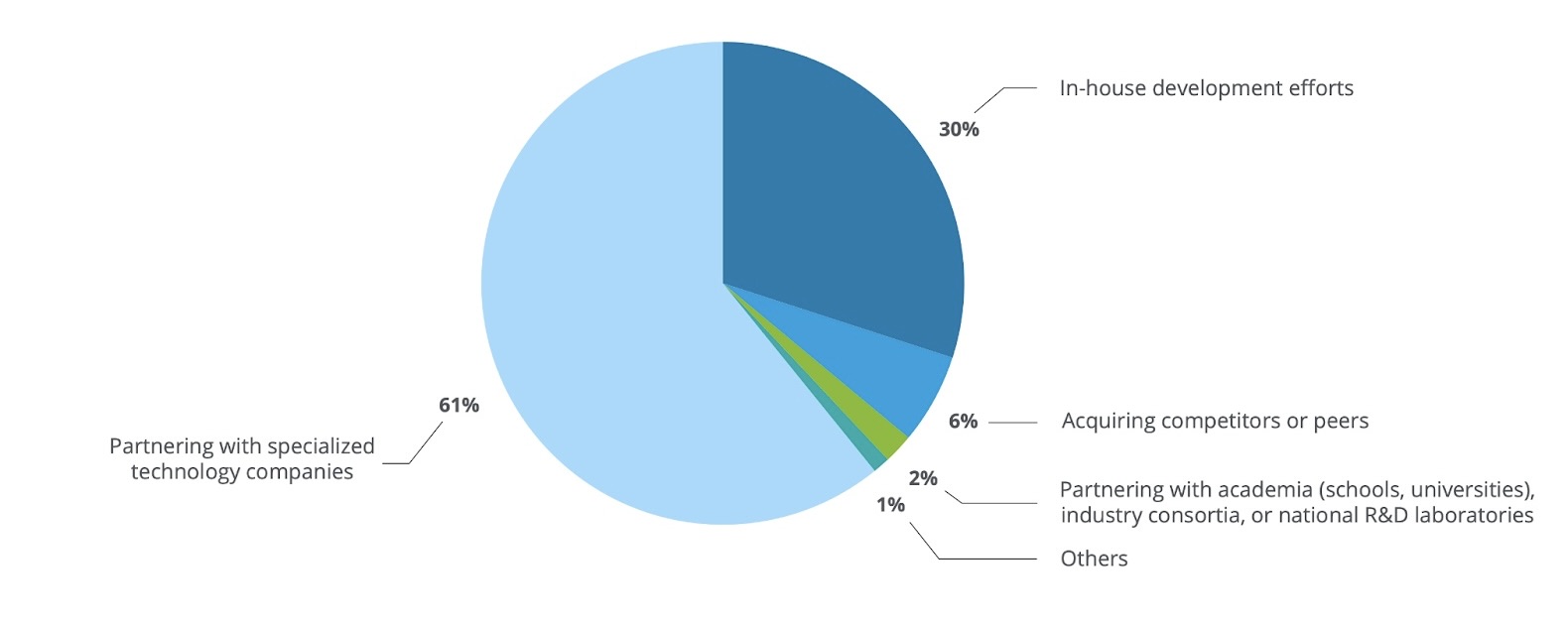Top 3 talent groups to upskill for organizational transformation
.jpeg)
• Digitalization and AI are driving forces in industries, leading to data-driven consumer experiences and operational optimization.
• Companies need to invest in upskilling and talent development to capitalize on innovation and execute organizational transformation strategies effectively.
• Tech talent is in high demand across industries, with a focus on automation, data analysis, and AI skills.
• Leaders must foster a digital culture, prioritize talent management, and develop leadership skills to drive organizational transformation.
• Customer service teams need to adapt to personalized services, new technologies, and evolving customer demands to stay competitive in the market.
Digitalization and AI are growing forces across industries, creating more data-driven, personalized consumer experiences and optimized operations. While these transformations present growth opportunities, companies must ensure that they have the skills and talent to make the most of innovation and execute organizational transformation strategies.
In fact, it's estimated that for every dollar invested in technology, around nine dollars need to be allocated to talent. With a strong upskilling and recruitment strategy in place, organizations will be better prepared to bring new services and value to the market with minimal disruption.
To explore the topic further, download our State of Industry Skills Report.
Why upskilling is critical to organizational transformation
Innovation often leads to a common challenge — businesses struggle to optimize their current talent pool to address not just organizational vulnerabilities, but also opportunities. As a result, industry leaders become reliant on the external market to fill the skill gaps needed for transformation.
At the same time, the new opportunities technology offers can only be scaled by an organization if it has capable leaders to guide organizational change management.
To succeed amongst changing industry trends, senior leadership teams need to invest in talent development, attraction, and reskilling to strengthen their capacity for transformation in the long term.
Discover the three emerging talent groups below that will drive organizational and skills transformation across industries.
Top skills and talent needed for organizational transformation
1. Tech talent
Businesses have a shortage of the most highly sought-after talent in the market — tech talent. However, in the current market, it’s not just tech companies who suffer from a lack of technically skilled talent.
Non-tech companies such as manufacturers and life sciences businesses listed twice as many tech jobs since the end of 2022. This comes down to two reasons:
- Companies are automating operations
- Tech is changing the outlook on customer service models.
Tech talent will revamp companies’ operations
Companies in the transport and manufacturing sector are automating manual jobs to increase efficiency, reliability, and sustainability in supply chains. But as AI adoption grows, companies will also expand their spending on operations, smart factories, and renewable energies. This will create new skill gaps in their supply chain pipeline and drive demand for highly skilled talent.
However, despite companies looking to expand and innovate their supply chains, only 28% rate themselves as digitally advanced. That means technology and AI transformation will not only demand a change of skills but also a talent pool capable of filling new data-driven and tech roles.

Companies outside of the tech industry will need pipelines in place to attract and develop talent with key skills in data analysis, cloud computing and AI for organizational transformation.
New customer service models need data expertise to manage complexity
Meanwhile, digital transformation has enabled banking, pharma and retail businesses to create powerful omnichannel brands that build consumer loyalty and drive sales. And the data backs this up. Consumers engaging with an omnichannel brand shop 1.7 times more than single-channel shoppers (i.e., a brand with only an in-store option).
At the same time, with an abundance of products and options to choose from online, in-store, and on social media, consumers are becoming increasingly selective. With so many touchpoints, new strategies are needed to ensure teams have the right data and tech skills to attract and retain customers across channels.
2. Leaders
With tech and skilled talent in high demand, leaders today must find ways to foster a digital culture and workplace that offers career mobility into leadership positions and encourages innovation.
However, poor leadership skills are damaging talent’s confidence in their managers.

HR and learning and development (L&D) leaders must prioritize a talent management strategy and succession planning that upskills leaders to create high-performing and engaged teams.
Structured global academies help global companies cultivate leadership skills, offer employees digital training and create career paths into critical management and C-level roles.
This not only allows companies to address labor shortages and increase employee retention, but it also makes them less reliant on acquiring third-party technical specialists to execute their organizational transformation.
No matter the sector, all leaders will need to continuously innovate their services and develop their leadership pipeline, customer communication, and resilience skills to optimize for change and gain market share.
3. Customer service teams
As technology offers more personalized services across sectors, customer service teams will need to learn new skills to keep up. Additionally, more customer touchpoints and closer relationships will demand greater emotional intelligence as well as problem-solving and inquiry skills to comply with new regulations and display the impact of products.
The banking industry is a great example: Fintechs are changing the landscape of traditional banking, capturing younger customers with more customized services and faster online payments. To stay competitive, employees across traditional banks will need to learn new interaction skills to consult customers in online and offline settings.

Therefore, L&D leaders should develop a strong succession plan that encourages employees to become subject matter experts and allows them to grow into new roles and niche client needs. As market demands continue to shift and evolve, this will help companies ensure they have the right mix of skills to gain clients’ trust in solutions.
Transformation in action: How IKEA reskilled customer service teams to embrace AI
One retailer that has embraced this approach is IKEA. They transformed their customer service and sales strategy in 2021 to embrace the impact of technology with a balance of reskilling solutions and new business areas. They introduced an AI bot named Billie — designed to address routine customer inquiries. Many initially expected that this would lead to the replacement of entire customer service teams, yet the opposite was true.
Instead, IKEA reskilled 8,500 call center staff to become interior designers. This generated billions of euros, and their reskilled customer service teams are now specialized in more creative work, ensuring valuable knowledge is not lost. In essence, they proved that HR and L&D leaders who can reskill their teams and optimize technology to develop new business areas will find success in digital transformation.
Digital transformation and talent management must align in one transformation strategy
The success of an organization will now be defined by its ability to capitalize on innovation. As digital transformation advances industry operations and procedures, companies must match the scale of organizational change with talent upskilling.
Companies that optimize internal operations to personalize consumer experiences, embrace strategic talent solutions, and upskill internally across their talent pipeline, will stand out in a competitive market and gain a stronger foothold in their industry.
Want to learn more about the skills industries need to stay competitive? Download our State of Industry Skills Report.

We offer a scalable employee training solution. It lets you continuously upskill your people.
Book a call.png)
Related articles
.png)
Review by:
Solve business problems or become obsolete: Caner Akova’s vision of L&D's future
Caner Akova, L&D Manager at Olympus, shares how L&D leaders must evolve from training providers to strategic problem-solvers who speak business language, address root causes of performance gaps, and drive measurable business outcomes.
Ready to drive impact together?
Close skill gaps, accelerate growth, and future-proof your workforce.












.jpg)

.png)
